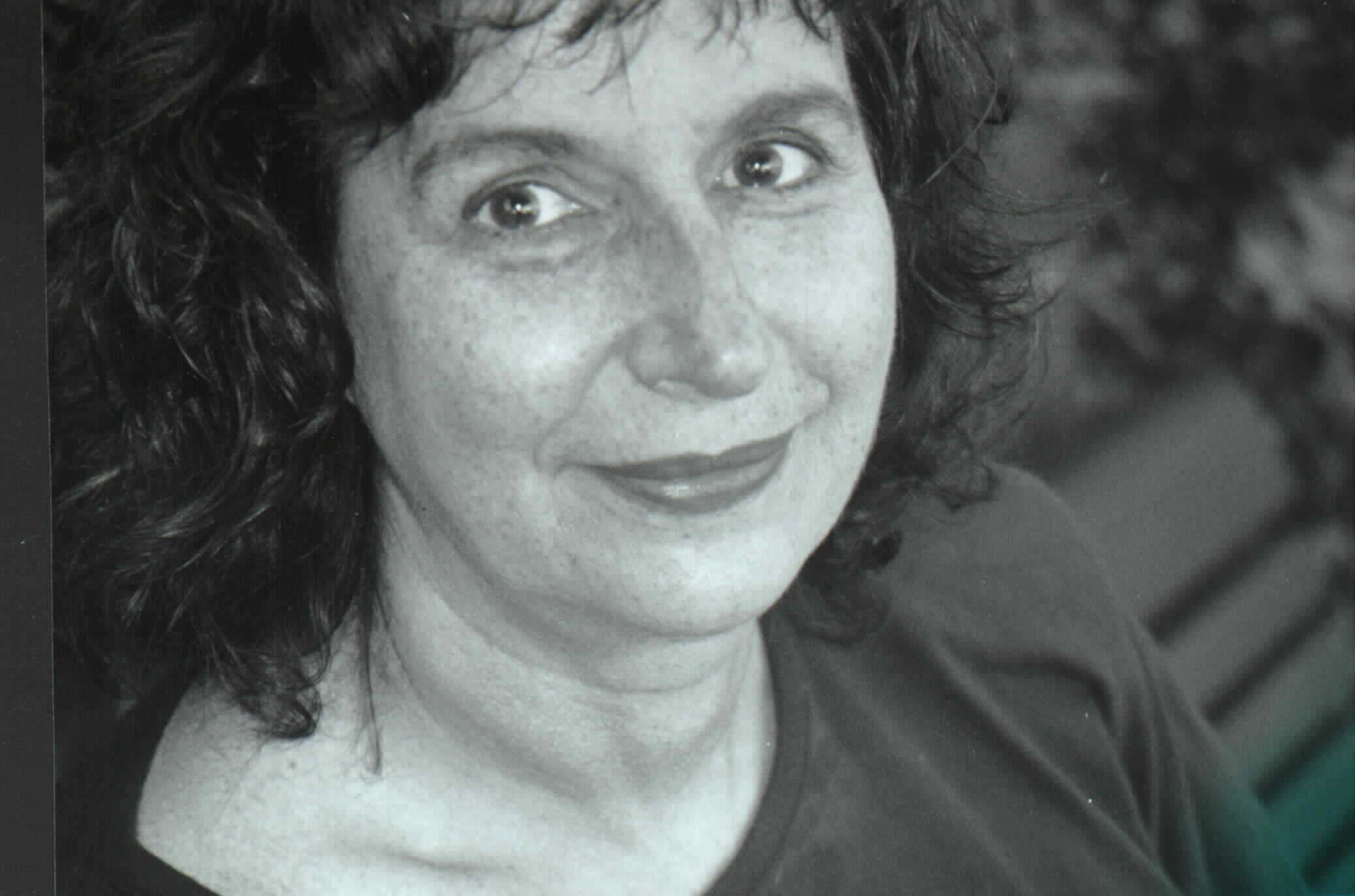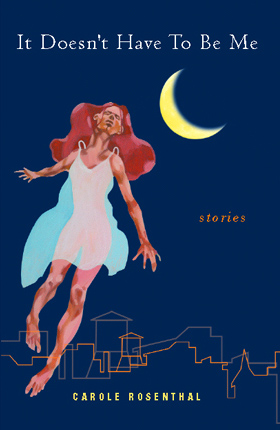Carole Rosenthal
From Carole Rosenthal's memoir: The Woods (1953) (March 2014 anthology Not Somewhere Else but Here, published by Sundress Publications.)
Carole Rosenthal is the author of It Doesn't Have To Be Me, a collection of short stories (Hamilton Stone Editions), and her fiction appears in a wide variety of periodicals, ranging from literary magazines like Transatlantic Review, Confrontation, Other Voices, and The Cream City Review, to Mother Jones, and Ellery Queen's Mystery Magazine. Her frequently anthologized short stories have been dramatized for radio and television, translated into eleven languages, and her articles and reviews published in newspapers and with presses including Dell, Arbor House, and the Modern Language Association. She teaches at Pratt Institute, in Brooklyn, where she is a Distinguished Professor. She lives part-time in New York City and part-time in the Catskills.
Reviews and Commentary
In "The Concert Pianist's Flight" by Carole Rosenthal the break with realism is almost complete. The concrete facts-- a musician's career and his indispensable spouse--fade into the background behind an incredible palette of language. The interaction between the partners is described with a visceral tactile approach that draws the reader towards the incredible concluding image.
– Miranda Siemienowicz, Horrorscope
Imagine those dreams in which you're in your old high school, even though the place looks nothing like your old high school. Events seem normal enough at first, but then, suddenly, everyone is using fire poles instead of stairs to get from floor to floor, and you realize you're wearing pajamas. Reading Rosenthal's short stories is like having one of those dreams. People say out loud what they would normally only think, and they act in ways usually inhibited by social convention, creating situations that cause the characters (and the reader) to wonder, "Did that really just happen?" Sometimes it's clear that it didn't– as in the group-therapy participant who swallows the group's leader whole–but other times, the premise is less fantastical, as in the New York woman who invites the homeless woman living under her building's stairwell inside for visits. Through these original and imaginative scenarios, Rosenthal explores ideas that would otherwise go unexamined, providing a fascinating glimpse of the fears that lurk beneath the surface of our everyday lives.
– Booklist
Many years ago Carole Rosenthal told me a story about receiving a rejection letter from a prominent and socially sophisticated editor. He wrote, “Sorry, but I don’t get it.” On the bottom of his letter his secretary wrote, “But I do!”
Rosenthal’s first book of short stories, stories written over decades, is a fertile, imaginative and at times hilarious collection. I’ve encountered her work in various settings. On the printed page, at readings. I’ve seen two of these pieces performed dramatically, in theatre settings. The older work I have revisited over time. And it is striking how the stories, the new as well as the old, shift with each encounter. How the nuances rearrange themselves.
In these stories we see people as they bring their basic fears into situations. The conflict between the rational and irrational self are continually explored. The tension between the two can be as funny as it is frightening. People make contact, avoid contact, make partial contact, play peculiar games. Human communications are interfered with by the conventions of daily life. When deep patterns of existence get jostled all hell can break loose.
Carole Rosenthal is a writer of social, psychological and political wisdom. She understands the structures of society. It is how the people in her stories move within those structures, structures only occasionally explicitly alluded to, structures that help us better understand forces both internal and external that inform daily life.
We live in a quasi apartheid society. Not once is this overtly stated in any of the stories. We see this in the consciousness of the various characters, all of whom are white. Some are borderline racist. Others are quite liberal and decent. Blacks, Mexicans, Chinese immigrants, other people of color, as well as impoverished people of indeterminate race, are continually in the shadows, always present, sometimes real, sometimes only in the fantasy life of the white characters.
In one story, “Broken Windows,” a sexually rejected woman, consumed with jealousy, effectively conjures up the specter of a Mexican woman as a cover for acts of revenge. In the same story another character talks with a kind of world-weary arrogance about Mexican children. He won’t let any political correctness interfere with the essential “truth” of his perceptions. The story ends in probably tragedy.
In “It Doesn’t Have to be Me,” the title story in this collection, the narrator has a fight with an ex-husband. Then they have sex. He says, “You didn’t let your self come, did you, baby?” She turns to the sky for solace, “The sickle moon. So spread my thighs and land on its cool-gold tip, letting it penetrate me. Rocking back and forth, leaning against its sharpness until it slides, melting inside me.” (The afterglow of this encounter is nicely captured in Duane Smith’s book cover.)
“Days of the Dead” moves us from a lunar triangle to a more earth-bound one, as a woman, her husband and the cremated ashes of her dead father have a raging, swirling encounter at a Mexican cemetery.
Carole Rosenthal’s work explores unconscious pre-verbal states. She looks at shame, guilt and desire. Subjects like age and weight and family relationships are written about with a sense of absurdity and the exuberant glee of revenge. There is both an acceptance of things and a profound discontent. She always writes with precision and there are times, like a great trumpet soloist, when Rosenthal steps forward and goes into an exquisite poetic riff.
The editor who didn’t “get” her story was on one side of the gender and class divide. The woman who worked as his secretary was clearly on the other. This division can, to a degree, still be perceived if one attends a reading of Carole Rosenthal’s. The men are far less obtuse than the editor. They are often lively and appreciative and seem to enjoy the work quite a bit. With the women however the response is electric and the laughter visceral.
This is a wonderful book, made all the more wonderful because of the years that the work spans. The reader has the added treat of watching the evolution and shifts in perception of a great artist.
Reading Carole Rosenthal’s work is an experience both humbling and exciting. For what I don’t “get” in one reading, I know is still there to be gotten in the next.
– Robert Roth, The Home Planet News (No. 49, 2003)
In this generous collection of short fiction by Carole Rosenthal we are introduced to what might seem to be the predictable and sometimes irrelevant palate of conflict and consciousness occasioned by female protagonists: the body and its disproportionate role in defining destiny; relationship dysfunction that stems from differing definitions of commitment; complicated relationships with oppressive mothers and tormented fathers; the need to both wield authority and suffer submission. But in Rosenthal’s wily narratives, the women, their partners, and their environments shift unpredictably, evoking broad humor and a decentering of our expectations of what women want and what women have.
Though usually employing conventional modes for time and action, Rosenthal stretches the genre, sometimes tipping the story into fable or fantasy, severing the links that would ground us in a particular where or when. The boundaries between waking and sleeping dreams, between past and present reality are permeable; we are pleasantly uncertain what is going to happen next. Has the homeless woman living under the steps to the building in “Some Christmases: actually been invited into the protagonist’s apartment and how is it that she assumed the role of hostess, gracious and sacrificial? Sure, the newly thin heroine of “Love Yourself” has only metaphorically eaten her therapist, but are the group members sincere in their praise that she looks like a “new woman?”
The final story of the collection, “Days of the Dead,” brings together the blurry and multiple themes of the book in a clear-eyed account of a woman’s pilgrimage to Mexico for the Day of the Dead celebration. She wishes to bury her father’s ashes there, in his beloved city, and bring closure to her intimate, but difficult relationship with him. Here, after the provocative chaos of the preceding collection, the sincerity and realism of this piece is affirmation that women’s desires are neither predictable nor irrelevant.
– Rain Taxi (Summer 2002)
These brief, often startling stories turn familiar urban situations into surreal moments of cautionary insight that will linger long in the reader's mind. In Carole Rosenthal's fictional universe stories lurch unpredictably into that haunting territory accessible only through the powers of imagination.
– Alix Kates Shulman, Memoir of an Ex-Prom Queen
Carole Rosenthal's stories are like doors to those spacious half-forgotten rooms that appear in dreams. I see myself and my experience in her work, parts I almost lost, or perhaps purposely kept hidden. Her language is original and often startling, penetrating what Virginia Woolf called "the cotton wool of daily life." At times the author seems to associate freely, yet each story reveals a beautifully constructed shape. While aware of her formal literary brilliance, I am still pushed into an intensity of emotion that feels raw and dangerous. Rosenthal's stories are deeply recognizable and yet utterly new. Hers is a completely original voice.
– Jane Lazarre, The Mother Knot and Inheritance
As Carole Rosenthal exposes the semi-disastrous relations between women and men, one feels as if too bright a light came on over the bathroom mirror: uh-oh, I really do look like that. But exposure of disaster, if sharply poignant, is often comical as well. You can laugh at the sight in the well-lit glass. The sly title, It Doesn't Have To Be Me, also says it IS "me," the ego--everyone's ego--deluding itself the more it tries to rationalize. But delusions secretly recognized and indulged create an absurd triumph of intelligence in these stories. Utterly clear and deadpan in style, right-on in observation, they'll do more for your elusive psyche than an hour with your analyst. Give this book to friends--after all, it doesn't have to be them.
– Jane Augustine, Arbor Vitae
Brilliant, buoyant, and disturbing, Carole Rosenthal's stories are about savvy characters who wear their insecurities like badges of honor. Written in a style that is weirdly innocent and often comic, the stories in It Doesn't Have To Be Me are psychological x-rays . . . sharply insightful, revealing....Funny and entertaining.
– Dalton Conley, Honky and Pecking Order
Carole Rosenthal's writing is rich, imaginative and passionate--its intensity almost unbearable . . . always exciting to read. The humor in these stories is sometimes boisterous and sometimes horrifying, but instantly recognizable. Her characters are so real we might want to avert our eyes--yet we do so at our own expense. Rosenthal is a unique sensibility. I love her writing!
– Lynda Schor, The Body Parts Shop and Sexual Harassment Rules
What a distinctive offbeat voice! Carole Rosenthal's stories have so much to say to us. These stories are often outrageous, funny, and always very, very serious."
– Edith Konecky, Allegra Maud Goldman and View to the North

